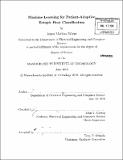Machine learning for patient-adaptive ectopic beat classification
Author(s)
Wiens, Jenna Marleau
DownloadFull printable version (8.413Mb)
Other Contributors
Massachusetts Institute of Technology. Dept. of Electrical Engineering and Computer Science.
Advisor
John V. Guttag.
Terms of use
Metadata
Show full item recordAbstract
Physicians require automated techniques to accurately analyze the vast amount of physiological data collected by continuous monitoring devices. In this thesis, we consider one analysis task in particular, the classification of heartbeats from electrocardiographic recordings (ECG). This problem is made challenging by the inter-patient differences present in ECG morphology and timing characteristics. Supervised classifiers trained on a collection of patients can have unpredictable results when applied to a new patient. To reduce the effect of inter-patient differences, researchers have suggested training patient-adative classifiers by training on labeled data from the test patient. However, patient-adaptive classifiers have not been integrated in practice because they require an impractical amount of patient-specific expert knowledge. We present two approaches based on machine learning for building accurate patientadaptive beat classifiers that use little or no patient-specific expert knowledge. First, we present a method to transfer and adapt knowledge from a collection of patients to a test-patient. This first approach, based on transductive transfer learning, requires no patient-specific labeled data, only labeled data from other patients. Second, we consider the scenario where patient-specific expert knowledge is available, but comes at a high cost. We present a novel algorithm for SVM active learning. By intelligently selecting the training set we show how one can build highly accurate patient-adaptive classifiers using only a small number of cardiologist supplied labels. Our results show the gains in performance possible when using patient-adaptive classifiers in place of global classifiers. Furthermore, the effectiveness of our techniques, which use little or no patient-specific expert knowledge, suggest that it is also practical to use patient-adaptive techniques in a clinical setting.
Description
Thesis (S.M.)--Massachusetts Institute of Technology, Dept. of Electrical Engineering and Computer Science, 2010. Cataloged from PDF version of thesis. Includes bibliographical references (p. 83-85).
Date issued
2010Department
Massachusetts Institute of Technology. Department of Electrical Engineering and Computer SciencePublisher
Massachusetts Institute of Technology
Keywords
Electrical Engineering and Computer Science.